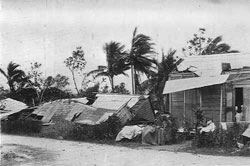
On February 15, 1898, the battleship Maine exploded in the harbor in Havana, Cuba, giving U.S. president William McKinley an excuse to declare was on Spain (Brás). The U.S. had long been interested in Cuba and Puerto Rico due to their important military locations in the Caribbean and economic potential, especially as an outlet for U.S. manufactured goods, but the U.S. government and military was able to frame the war as freeing these islands from Spanish oppression (Brás). The U.S. won the war quickly and demanded that Puerto Rico be turned over from Spain to the U.S. without any compensation as well as the evacuation of Spanish troops from Cuba, which would also be handed off to the U.S. until the formation of a new Cuban government (Brás). President McKinley then signed the Treaty of Paris, giving the U.S. control over all land and military infrastructure formerly owned by Spain, and on October 18, 1898, Puerto Rico officially became a territory of the U.S. (Brás).
Less than a year later, on August 8, 1899, Hurricane San Ciriaco hit the island with winds up to 100 miles per hour and heavy rains that lasted almost a month (Hurricane San Ciriaco). This storm was one of the most destructive in the island’s history. Around 3,400 are estimated to have died in the storm, and many others had their homes and livelihoods destroyed (Hurricane San Ciriaco). Crops were also hit hard by the storm, and the resulting shortage of food led to further loss of life. President McKinley began a huge relief effort for the island, distributing around 32 million pounds of food after the crisis (Erman). While this effort undoubtedly saved many lives, many critics of U.S. rule on the island saw this effort mostly as a ploy to show islanders the promised benefits of living under U.S. rule (Erman). The mass destruction left in the storm’s wake also gave the U.S. government the opportunity to blame Spain in part for the disaster, citing poor Spanish infrastructure as one reason why the island faced such devastation (Erman). After the hurricane, then Secretary of War Elihu Root claimed that Puerto Rico would receive “more generous and beneficent treatment” under U.S. rule, though this would quickly be disproven the next year in 1900 when the U.S. passed the Foraker Act, shutting Puerto Ricans out from U.S. citizenship, full constitutional rights, federal voting rights, and the right to choose their own governor (Erman).
Works Cited
Brás, Marisabel. “The Changing of the Guard: Puerto Rico in 1898.” The World at 1898: The Spanish-America War. Library of Congress, June 22, 2011. https://www.loc.gov/rr/hispanic/1898/bras.html.
Erman, Sam. “Puerto Rico: A Tale of Two Hurricanes.” The Daily World, September 22, 2018. https://www.thedailyworld.com/opinion/puerto-rico-a-tale-of-two-hurricanes/.
“Hurricane San Ciriaco.” The World at 1898: The Spanish American War. Library of Congress, June 22, 2011. https://www.loc.gov/rr/hispanic/1898/sanciriaco.html.
